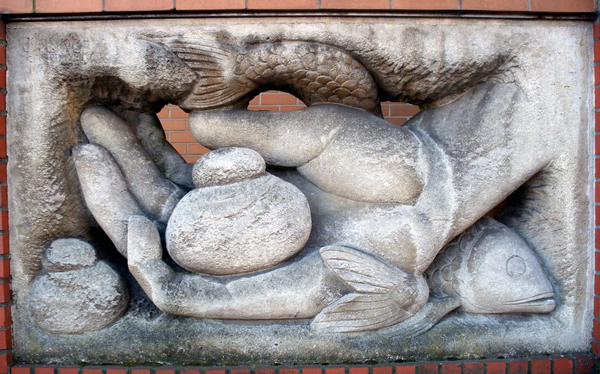
The readings for Pentecost 9, Aug 2, 2020 are here. The focus is on Gospel reading – Matthew 14:13-21, the feeding of the 5,000
In the narrative section (13:53–17:27) leading up to the discourse on the community (chap. 18), Matthew emphasizes the shaping of the disciples into the nucleus of the Church. The unbelief of Jesus’ own people (13:54-58) and the prefiguring of his own passion in the martyrdom of John the Baptist (14:1-12) form the setting for the feeding of the five thousand. The provision of abundant food in the wilderness was part of God’s mighty acts in the exodus. Such feeding was also expected as part of the messianic age (Isaiah 25:6). Bread is also a symbol of salvation, the life and truth that Jesus brings (15:26; Isaiah 55:2-3). Thus Jesus fulfills the promise of the law and the prophets and gives a foretaste of the eschatological banquet.
The emphasis of the event is not so much upon the miraculous nature of the feeding, for the usual reference to the astonishment of the disciples and crowd (12:23, 14:33) is absent, as it is upon the implied revelation of who Jesus is.
For the early Church, the eucharistic significance of the feeding made it a central experience in the narratives of Jesus’ ministry. The pattern of events foreshadows the pattern of the Eucharist and, indeed, the pattern of our Christian lives. Jesus takes the food, blesses it by giving thanks, breaks it, and shares it with the people. It is the only miracle recorded in all four of the gospels (Mark 6:32-44; Luke. 9:10-17; John 6:1-13).
There are several key words – broken, filled and compassion.
1. Broken
Jesus breaks the bread. He “broke the loaves” and “they took up what was left over of the broken pieces, twelve baskets full.”
In church, the breaking of the eucharistic bread may help us recall Christ’s sacrifice and death. In our lives, it is our very selves we are challenged to break—our limits of prejudices, fears, and old attitudes. God calls us to break through to a new awareness of the power of God’s love and of the needs of our brothers and sisters. We take what is left and distributed to those who have needs. Jesus gives the work back to the disciples to carry on the mission
In the liturgy of the early Church, the people would walk up to receive the bread. Then, without returning to their places, they would leave immediately, prepared to take what they had received into God’s world.
As Paul proclaims that nothing, not our fears, not our sins, not the crushing powers of this world or any other can keep us apart from the love of God shown us in Jesus our Lord. Our lives are broken, but we are loved forever.
2. Filled
“And all ate and were filled..”
As Bishop Rob Wright stated this week “God is lively and breaks into situations.” Charity is good but the church should be in the justice business to make sure all are filled.
Matthew places this story in a section of the gospel about training the disciples for their mission, so perhaps Jesus is teaching them about what they can do and for us what we can do in our own time.
We have the resources to fill. An article from the Brookings Institute “In 2018, U.S. households held over $113 trillion in assets. For context, that is over five times as much as all the goods and services produced in the U.S. economy in a single year. If that amount were divided evenly across the U.S. population of 329 million, it would result in over $343,000 for each person. For a family of three, that’s over a million dollars in assets.”
We need to take the initiative to fill. Let’s be leaders. We need to provide resources as a church to those hit by COVID and in general to see what we can do about poverty. We need a better distribution of funds for children’s education.
Jesus transforms the environment of the 5,000 from fear and scarcity by filling the body and also filling imagination that God hold out for us in what we can do for our world. We have a commandment to share
3. Compassion
“When he went ashore, he saw a great crowd; and he had compassion for them and cured their sick. ”
Note this happens even before the feeding of the 5,000.
It is easy to think that once we help people to be filled that’s it. Henri Nouwen provides a foundational step.
“As busy, active, relevant [people], we want to earn our bread by making a real contribution. This means first and foremost doing something to show that our presence makes a difference. And so we ignore our greatest gift, which is our ability to enter into solidarity with those who suffer. . . .
“Those who can sit with their fellow man, not knowing what to say but knowing that they should be there, can bring new life into a dying heart. Those who are not afraid to hold a hand in gratitude, to shed tears of grief, and to let a sigh of distress arise straight from the heart can break through paralyzing boundaries and witness the birth of a new fellowship, the fellowship of the broken.”
It is those moments when people stay with us in the midst of crisis that real compassion occurs. You may not know what to say but I want to demonstrate that I am with you and I will not leave you along. We share in the other’s vulnerability and experience that person’s weakness and powerlessness. “They show their solidarity with us by willingly entering the dark, uncharted spaces of our lives. For this reason, they are the ones who bring new hope and help us discover new directions.”
